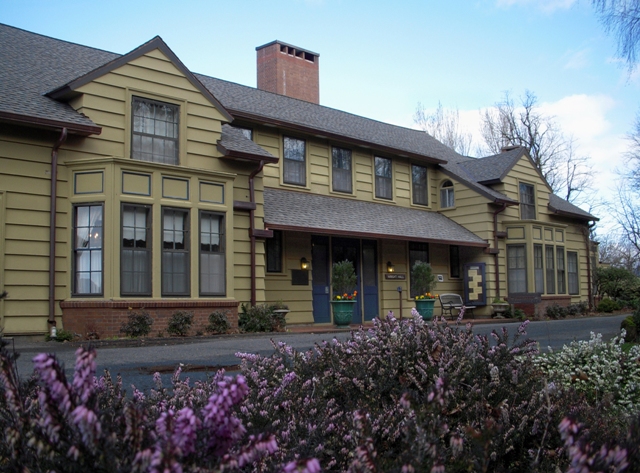
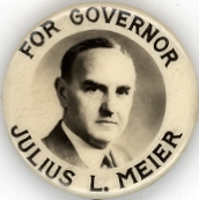
button (photo courtesy of Menucha
Retreat and Conference Center)
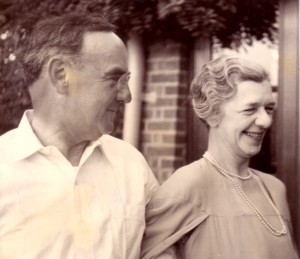
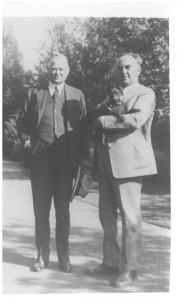
and Julius Meier
(photo courtesy of Menucha
Retreat and Conference Center)
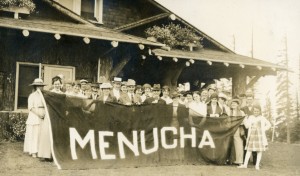

courtesy of Menucha Retreat and
Conference Center)
Wright Hall, the main lodge at Menucha Retreat and Conference Center in Corbett, began its life as the centerpiece of a country estate owned by former Oregon Governor Julius Meier. Built in 1926-27, the 6,000+ square foot home designed by architect Herman Brookman, was a comfortable retreat from Meier’s work managing Meier & Frank, the largest department store in Portland. Menucha (a Hebrew word meaning “renewing stillness”) also served as a place to entertain guests, including thousands of Meier & Frank employees for annual picnics and President Herbert Hoover who relaxed there for two weeks shortly after he left the White House in 1933.
Governor Meier died in 1937 and his family put Menucha up for sale in 1948. After a year on the market with no offers, the family announced they would be willing to sell at a lower price if a group could use it for some good purpose. In 1950 the First Presbyterian Church of Portland purchased the 102-acre estate for $60,000 and began to operate it as a nonprofit retreat and conference center.
Today, Menucha offers excellent food, an amazing view of the Columbia River Gorge, comfortable accommodations and one-of-a-kind meeting spaces and gardens. Thousands visit annually, from faith-based groups to family reunions to retreats for people recovering from addiction or cancer to art and music workshops. Nonprofit organizations use it for board meetings, volunteer trainings, and staff planning events. Executive Director Spencer Parks says, “Menucha is a place to get away from daily distractions to focus on other pursuits that enrich guests’ lives. We’re a nonprofit serving other nonprofits, families, communities, and individuals.”
As a result of years of wear and tear from the Gorge’s gusty weather and its many guests, Wright Hall has been showing its age. Menucha’s Board of Commissioners evaluated its needs in 2009 and began prioritizing a series of repairs and renovations which would honor its historic appearance. Previously the building had undergone only minor alterations.
The evaluation found that Wright Hall’s roof needed replacing; its brick porch along the north side was crumbling in spots; and its two brick chimneys had masonry problems, including a small tree growing out of one! The cost estimated to put on a new roof, rebuild the chimneys and create a brick terrace was just over $250,000. Menucha’s Commissioners partnered with the Friends of Menucha Foundation to launch the successful “Raise the Roof” fundraising campaign in 2009 to address these critical problems. Thanks to gifts from many individual donors and the aid of five foundations – the M.J. Murdock Charitable Trust, the Collins Foundation, the Meyer Memorial Trust, the Kinsman Foundation, and the Wheeler Foundation – the work was completed in 2012.
Wright Hall’s kitchen was next in line for an update. The lodge’s original kitchen had been enlarged in the 1980s to feed up to 80 guests but now needed to serve up to 140 guests at one time. Much of its equipment was already used when it was purchased in 1984. Twenty-five years later, some stovetop burners worked intermittently and the ovens didn’t always hold proper heat, leading the Food Service Manager to quip, “There are three miracles a day at Menucha: breakfast, lunch and dinner!” In 2011-2012 Menucha’s supporters raised over $105,000 in donations for new kitchen equipment. This state-of-the-art kitchen, completed in 2013, is truly a gift that keeps on giving.
The Friends of Menucha Foundation’s current fundraising campaign, called “The Greening of Menucha,” focuses on badly needed energy efficiencies, a long-term investment that will keep Wright Hall more comfortable for guests, more economical to operate and better for the environment.
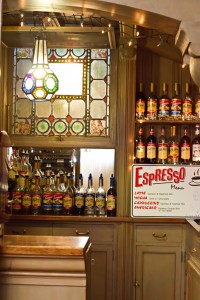
as an espresso bar (photo courtesy of
Menucha Retreat and
Conference Center)
When Wright Hall was constructed, it was common practice to use old newspapers and dried grass for insulation; a patchwork solution that needs to be replaced. The original windows and hanging light fixtures were state-of-the-art in 1927. The windows now leak badly and the light fixtures are inefficient. Facility Operations Director Tim Kurkinen expects the final cost to repair all of Wright’s windows, add insulation, and upgrade light fixtures will cost over $300,000. While the next phase is significant, Menucha is committed to keeping improvements in character with its historic lodge. Previous guests will be glad to know that the Prohibition-era speakeasy hidden behind a moveable basement wall in Wright Hall – now used as an espresso bar – will always retain its low-light air of mystery.

